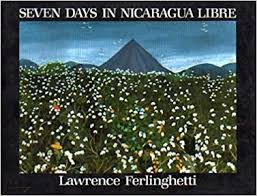How many of our most famous novelists, for instance, have bothered to take the two-and-a-half hour flight from Miami and see for themselves what’s going on here?
—Lawrence Ferlinghetti
I first read Seven Days in Nicaragua Libre in the mid-eighties; Ferlinghetti and I had both visited Nicaragua in 1984 (I on a Kentucky Witness for Peace delegation). I looked at the book again ten years ago, when Becca Gorley and I were reading from the City Lights Pocket Poets series. At that time, I was, still, trying to write something about our times in the West Bank and Gaza, and Ferlinghetti’s account was one of several books I read for provocation and inspiration. Many things, you can’t force; Dear Layla Welcome to Palestine was self-published in summer 2015.
A man of the Left, Ferlinghetti saw Nicaraguan history this way: “What has happened here, rather, is the overthrow of a tyrant (Somoza) supported by the U.S., and the attempt to overthrow the economic tyrant of colonialism in which Latin America has been for centuries the cheap labor market for North American and multinational business.” Many U.S. citizens may suffer amnesia about this appalling history but Latin Americans have a long memory.
The City Lights publisher met up with kindred poetic spirit, Ernesto Cardenal, Minister of Culture during that period. Cardenal had previously clashed with U.S. poet and pacifist Daniel Berrigan for views such as the following told to Ferlinghetti: “And the peasants of Solentiname who studied the Gospel in depth could not help but feel solidarity with their brothers and sisters in other parts of the country who were suffering persecution and terror, who were imprisoned, tortured, assassinated, raped, whose ranches were burned, and who were thrown out of helicopters. They also felt solidarity with all those who were giving their lives for love of their neighbor. And for this solidarity to be real, one’s safety and one’s life must be risked. In Solentiname we knew that if we wanted to put the word of God into practice, we weren’t always going to enjoy peace and tranquility. We knew that the hour of sacrifice would arrive; and that hour arrived.…One day a group of young men and women from Solentiname (some from my community), because of their growing deep convictions, decided to take up arms. Why? For one reason only: for love of the kingdom of God. Because of a fervent desire for social justice, for a real and concrete kingdom of God on earth.” Not surprisingly, the Somozan National Guard destroyed that community.
Ferlinghetti learned about Tomas Borges, a Sandinista revolutionary and the Minister of Defense: “Tortured for years in Somoza’s prison, after the Sandinista takeover he recognized one of his torturers in a prison lineup, and he is reported to have said, ‘My revenge is to have you shake my hand.’ Joan Baez made a song of this and sang it here in Spanish a couple of years ago.”
Witnessing the violence inflicted on Nicaragua during the contra war, Ferlinghetti had this vision of utopia: “Someday there will be no more war in Nicaragua, no more peasant soldiers killing other peasants, but instead there will be an abundance of schools, day care centers, hospitals and clinics for everyone, adequate food and shelter for everyone, art and recreation for everyone, and most importantly, love among everyone.” U.S. policy, then as now, is dead-set against such incendiary developments, in Nicaragua, and any other country we have historically dominated.
Ferlinghetti’s travelogue, like so many from that period and even comparable efforts today about other struggles and places, are doomed to be period pieces, soon or eventually forgotten. However, a reader may come across a text and photos like this, and seeds will be planted that may one day come to some kind of cultural, spiritual, and/or political fruition.
Lawrence Ferlinghetti, Seven Days in Nicaragua Libre (City Lights Books, 1984). Photos by Chris Felver.
